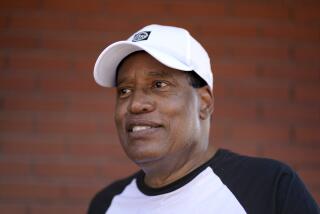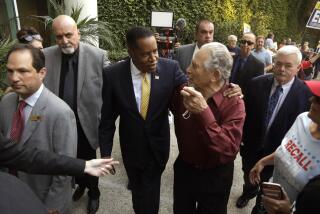Ex-Atty. Gen. Evelle Younger Is Dead at 70
- Share via
FBI agent, judge, Los Angeles prosecutor, California attorney general and one-time Republican nominee for governor, Evelle J. Younger died quietly, and suddenly, Thursday in his Hollywood Hills home.
He was 70.
His only child, Superior Court Judge Eric E. Younger, said he had lunched with the former attorney general on Wednesday and he was well. Around 8 a.m. Thursday, his wife, Mildred, summoned paramedics to the family residence above the Sunset Strip when Younger did not rise from his sleep.
He died of heart disease, said Los Angeles County coroner’s spokesman Bob Dambacher. His family said he had not seen a doctor in two months.
During nearly four decades as one of California’s most durable law enforcement politicians, Younger tangled with some memorable characters, famous and infamous, of those turbulent times.
He was Los Angeles County district attorney during the prosecutions of mass murderer Charles Manson and Sirhan Sirhan, assassin of Sen. Robert F. Kennedy. He was the first prosecutor in America to undertake mass felony prosecutions of college campus demonstrators in the 1960s. As state attorney general, he ran for governor and lost to Edmund G. (Jerry) Brown Jr. He also pushed the landmark case that gave rise to the modern environmental impact statement on private developments.
Among his political friends were Presidents Richard M. Nixon, Ronald Reagan and Gerald R. Ford.
Through it all, campaign after campaign, office after office, Younger stood as rock-jawed testament to the fact that political success and survival in California are not always a matter of one’s gifts for grandstands and fireworks or the sweep of one’s ideology.
Younger gave a good name to the reserved, down-to-business Midwestern style of political administration and steadfast moderation.
“Evelle Younger served the people of California with great dedication and distinction,” said former President Reagan on Thursday. “He was a loyal and trusted member of our (GOP) team. Nancy and I are deeply saddened by Evelle’s passing and extend our sympathy and prayers to his family.”
Younger had been attorney general when Reagan was governor.
Younger was known by subordinates and associates as “The General,” befitting his position as attorney general, his rank as a reserve Air Force major general, and his general demeanor.
A rival once called him as exciting as a “mashed potato sandwich,” a remark that followed him for years. “I don’t think I am dull,” he responded in an interview later, “but I suppose I may not be the best judge of that. Whatever I am, the public has confidence in me. They obviously perceive me as an honest, competent and hard-working professional and that’s just what I am.”
Younger lost only one election but it was his biggest, the 1978 campaign against incumbent Brown, who was then at the height of popularity. Younger never sought public office again.
Until then, Younger’s career had been a methodical, 37-year advance up the law enforcement political ladder.
A native of Nebraska with a law degree from Nebraska University, Younger became an FBI agent and served with military intelligence in the Burma campaign during World War II. He also served in the Korean conflict.
He married in 1942 and shared with Mildred Younger a life-long bent for politics. The daughter of a politician, she was a candidate for the Legislature.
Became a Judge
After the war, Younger worked for a year as a Los Angeles deputy city attorney and as Pasadena city prosecutor. He was appointed a Municipal Court judge by then-Gov. Earl Warren. Next, he won election to the Superior Court.
His political profile rose substantially in 1964 when he was elected district attorney of Los Angeles County. He was reelected in 1968. During his tenure were the Watts riots of 1965, the assassination of Sen. Robert F. Kennedy in 1968, the diabolical Manson cult murders of 1969, and the campus civil rights and anti-war upheavals of the late 1960s.
“I had the most interesting jobs any lawyers had at the most interesting times,” Younger once said reflectively.
In 1970, he became the first Republican in a generation to win the office of state attorney general. Younger campaigned as someone tough on crime but sympathetic to consumer and environmental interests.
“I was particularly impressed with his respect and concern for the environment,” said Democratic Lt. Gov. Leo T. McCarthy. He called Younger a “respected moderate.”
Important Ruling
In particular, Younger is remembered for pursuing the 1972 Mammoth Lake case. This resulted in the most important environmental ruling of that decade--that public agencies cannot sanction new construction without first evaluating the environmental impact it will cause.
Younger’s environmental support dwindled later when he became a champion of nuclear power.
Another Democrat reacting to the death was John K. Van de Kamp, who succeeded Younger as both Los Angeles County district attorney and attorney general. He called Younger a “fine administrator and a fine man to work with over the years.”
As with most public men whose careers were as lengthy as his, Younger’s was not without its share of controversy.
His biggest political blunder occurred after he won the GOP gubernatorial nomination in June of 1978. He then went to Hawaii on vacation. This left Gov. Brown time to reverse course and become a champion of the historic Proposition 13 tax cuts that were approved in that election.
Received Four Pensions
Younger was also widely ridiculed for receiving four pensions--from the city and county of Los Angeles, the state and the military--while still of working age.
Back in the McCarthy era of the 1950s, it was a different and less moderate Younger who proclaimed: “With the Red sympathizers in working control of most, if not all, of the Democratic Party in California, the only thing for loyal American members of that party to do is join with Republicans to defeat this Communist menance.”
In the late 1960s, Younger showed little mercy in confronting campus unrest. He prosecuted 24 students on 1,730 felony charges when they took over two buildings at San Fernando Valley State College (now Cal State Northridge) and held administrators hostage. The students, most of them black, were protesting the absence of black studies programs.
In 1971, after disclosures of the U.S. massacre of civilians in My Lai, Vietnam, Younger the military man warned of the “big lie technique” that was being used to confuse the public between the “good guys and bad guys.”
After his retirement from politics, Younger became a partner in a Los Angeles law firm and maintained a large, active circle of friends and an interest in public affairs.
Funeral arrangements are pending but a memorial service has been scheduled Monday at 3 p.m. at All Saints-Episcopal Church in Beverly Hills.
More to Read
Sign up for Essential California
The most important California stories and recommendations in your inbox every morning.
You may occasionally receive promotional content from the Los Angeles Times.













